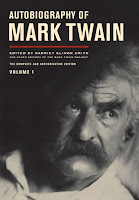Twain had specified that his autobiography remain unpublished for a century after his death, to ensure that he felt free to speak his "whole frank mind", knowing that when his "Final (and Right) Plan" for relating the story of his life was eventually published, he would be "dead, and unaware, and indifferent". The author passed away on 21 April 1910, and this November, the University of California Press will publish the first volume...It took a long time to get to me through a long waiting list at the library, and now that I've read it, I have to say that I've been rather disappointed.
Running to half a million words, the trilogy of books will cover Twain's relationship with his secretary Isabel van Kleek Lyon, his religious doubts and his criticisms of Theodore Roosevelt, according to the Independent.
There is nothing "wrong" with the book. On the contrary, it is an immensely detailed, scholarly compilation of Twain's written and dictated autobiography. The editors clearly intended this to be the definitive academic publication on Twain's life. To that end in Volume 1 they supplemented the several hundred pages of text with another several hundred pages of notes and prefaces to create a weighty and frankly cumbersome tome. A good biographer selects material from the subject's life; this autobiography compiles everything, discarding nothing, and weighting everything equally. The result is that the enjoyable bits are smothered under a profusion of trivia.
I did find one new word - "supposititious," as in this sentence about Joan of Arc: "They set several traps for her in a tentative form; that is to say, they placed supposititious propositions before her and cunningly tried to commit her to one end of the propositions...." I guessed the meaning, but had to look up the word to confirm that it was real, and I didn't even have to dig into the OED. It's in Merriam Webster, meaning "fraudently substituted, spurious, hypothetical", from the Latin suppositicius. You'd think a 64-year-old former English major would have run into this word before - but I don't recall ever having seen it.
And this anecdote intrigued me: "...the vast fireplace, piled high, on winter nights, with flaming hickory logs from whose ends a sugary sap bubbled out but did not go to waste, for we scraped it off and ate it..." (p. 212). I've seen logs in the fireplace "bubble" like that when the wood was green; I had never thought about scraping the sap off to eat. Perhaps I wouldn't have been as surprised had the wood been identified as maple - but hickory?
One other anecdote really struck me; I've written it up as a separate post below this one. Other than that, I didn't find much from the book to share on this blog. I have no doubt that this will be a milestone book and will be widely praised in academia for its comprehensive attention to detail, but for the reasons I've mentioned, I'm not adding it to this blog's list of recommended books, and I have doubts whether I will even bother tackling volumes 2 and 3.

ليست هناك تعليقات:
إرسال تعليق